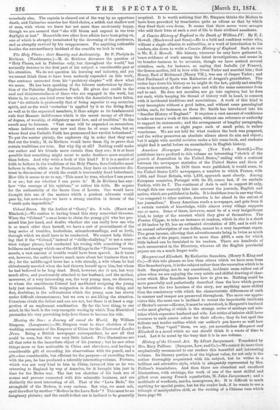The Holy Places : their Sanctity and Authenticity. By F.
Phelpin de Rivieres. (Washbourne.)—M. de Rivieres discusses the question of "Holy Places, not in Palestine only, but throughout the world," but naturally devotes to the first part of his subject a considerable part of his attention. We do not question his learning and industry, and yet we cannot think them to have been uselessly expended on this work, One sentence extracted from his "prefatory chapter " will show what we mean. He has been speaking of the labours undertaken by direc- tion of the Palestine Exploration Fund. He gives due credit to the zeal and disinterestedness of those who are engaged in the work, but there is, he says, one fatal error into which the Association have fallen, that "its attitude is professedly that of being superior to any sectarian spirit, and as the word 'sectarian' is applied by it to the living Body as well as to the separated members, it thus adopts as its fundamental rule that Masonic indifference which is the secret enemy of all ideas of dogma, of worship, of obligatory moral law, and of tradition." So the result may be foreseen. "Vast sums will be expended on researches, whose indirect results may now and then be of some value, but on whose final aim Catholic Faith has pronounced her verdict beforehand." To put the matter plainly, the explorers dig in order that they may find out the truth; M. de Rivieres would have them dig to prove that certain traditions are true. But why dig at all ? Nothing could make our author and his friends more certain than they are; it is at least
possible that something might occur to make doubters more sceptical than before. And why write a book of this kind ? If it is a matter of faith to believe in the traditions of the Holy Places, then Catholics must believe in them, while as for Protestants, they have an inveterate dis- trust in discussions of which the result is irrevocably fixed beforehand.
How idle it seems to us to say, ' This must be true, whether I can prove it or no ; but see whether I can prove it.' M. de Rivieres has any- how "the courage of his opinions," or rather his faith. He argues for the authenticity of the Santa Casa of Loreto. One would have thought this one of the matters which a prudent advocate would pass by, but now-a-days we have a strong reaction in favour of the "credo quia impossibile."






































 Previous page
Previous page